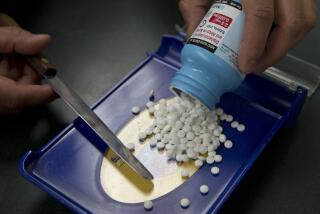Study Cites Lack of Women Participants in Drug Trials : Health: GAO says FDA should ensure that pharmaceutical firms analyze data by gender.
- Share via
WASHINGTON — The Food and Drug Administration should do more to ensure that pharmaceutical firms include representative numbers of women in studies of new drugs and should require drug makers to analyze trial data by gender, according to a report to be released today.
The General Accounting Office said an analysis of clinical trials during a 2 1/2-year period starting in January, 1988, showed that--while women were included in research--their numbers were not representative of women in the general population who suffered from the disease in question.
Manufacturers also did not analyze whether women responded differently from men to the drugs or whether the drugs interacted with hormones in a woman’s body, including those found in oral contraceptives, the GAO, the investigative arm of Congress, said.
“The lack of analysis can create a critical gap in information about how best to tailor drug therapies for women,” the GAO said.
The report is slated for release today by Rep. Henry A. Waxman (D-Los Angeles), chairman of the House Energy and Commerce subcommittee on health and the environment, and Rep. Patricia Schroeder (D-Colo.), co-chair of the congressional caucus on women’s issues.
“There is no dispute that men and women can respond differently to the same medication,” Waxman said in a statement. “Body weight, metabolism, hormones and the reproductive cycle can affect, oftentimes profoundly, the effectiveness and safety of medications.
“The frequent failure of drug companies to determine whether such differences exist, and the apparent unwillingness of the FDA to consistently require the needed statistical analysis, places over half of our population at risk of less effective medical care,” he added.
In response to the GAO report, FDA officials said Wednesday that they have increased efforts in recent years to expand and improve the participation of women in drug trials, but acknowledged that more must be done.
“The fact is, we have to work harder to ensure that products get more quickly to patients based on data that is relevant to all patients,” said Carol Scheman, the FDA’s deputy commissioner for external affairs. “We’re deeply committed to moving on in this agenda.”
The report comes at a time when government agencies--such as the FDA and the National Institutes of Health, which awards federal research grants to academic scientists and others--have begun to confront a long-held medical research policy of excluding women.
The tradition stems from scientists’ beliefs that women are harder to study because their bodies are more complicated than those of men. The chance that they could become pregnant made involving them in drug tests riskier, and their constantly changing hormone levels could skew test results, the reasoning went.
Rather than incorporate these variables into the design of studies, researchers simply left women out of them.
In recent years, however, intense pressure has been mounted on the NIH, the FDA and the entire research community to change those policies. Critics have argued that women suffer from many of the same diseases as men, and information about how they respond to new drugs for these conditions is necessary and important.
The agency’s existing guidelines to drug makers recommend that the full range of people who would take a drug after it is licensed be represented in tests, the GAO report said. But the “FDA has not defined the term ‘representative,’ ” the report noted.
A 1991 survey of the drug industry “supports the view that such guidance would be useful,” the report said. The survey concluded that there is “no consensus on what the FDA expects regarding the inclusion of women in drug trials,” the GAO said.
For example, the survey found that 56% of the major drug manufacturers said the FDA had requested that they use women when designing their drug trials; but 44% said that the agency had made no such request, the report said. Furthermore, 24% reported that they do not deliberately recruit representative numbers of women as participants in drug testing, the report said.
The FDA’s Scheman urged agency critics to maintain the proper perspective on the issue.
“The job of this agency is not to find ways to put more people into clinical trials” because the trials themselves can pose considerable risks, she said. The FDA’s responsibility is to ensure that there is “an adequate number of people to answer the questions as quickly as possible,” she said.
More to Read
Sign up for Essential California
The most important California stories and recommendations in your inbox every morning.
You may occasionally receive promotional content from the Los Angeles Times.








